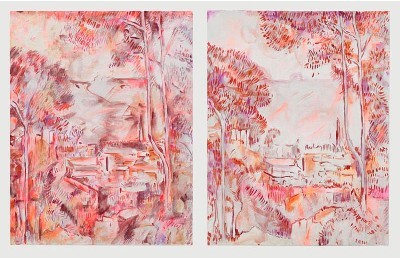Signatures
25 Jun - 24 Jul 2010

© Jutta Koether
INKARNAT GEFUNDEN FESTGESTELLT AUSGEFÜHRT #2 (Diptych), 2009
Acrylic on canvas
50 x 40 cm / 19 3⁄4 x 15 3⁄4 cm (each)
INKARNAT GEFUNDEN FESTGESTELLT AUSGEFÜHRT #2 (Diptych), 2009
Acrylic on canvas
50 x 40 cm / 19 3⁄4 x 15 3⁄4 cm (each)
SIGNATURES
25 June - 24 July 2010
Marcel Broodthaers
Marcel Duchamp
Jutta Koether
Louise Lawler
Man Ray
Josh Smith
Reena Spaulings
Cheyney Thompson
‘The author is the principle of thrift in the proliferation of meaning. As a result, we must entirely reverse the traditional idea of the author. We are accustomed, as we have seen earlier, to saying that the author is the genial creator of a work in which he deposits, with infinite wealth and generosity, an inexhaustible world of significations. We are used to thinking that the author is so different from all other men, and so transcendent with regard to all languages that, as soon as he speaks, meaning begins to proliferate, to proliferate indefinitely.
The truth is quite the contrary: the author is not an indefinite source of significations that fill a work; the author does not precede the works; he is a certain functional principle by which, in our culture, one limits, excludes, and chooses; in short, by which one impedes the free circulation, the free manipulation, the free composition, decomposition, and recomposition of fiction. [...] The author is therefore the ideological figure by which one marks the manner in which we fear the proliferation of meaning.
All discourses, whatever their status, form, value, and whatever the treatment to which they will be subjected, would then develop in the anonymity of a murmur. We would no longer hear the questions that have been rehashed for so long: Who really spoke? Is it really he and not someone else? With what authenticity or originality? And what part of his deepest self did he express in his discourse? Instead, there would be other questions, like these: What are the modes of existence of this discourse? Where has it been used, how can it circulate, and who can appropriate it for himself? What are the places in it where there is room for possible subjects? Who can assume these various subject functions? And behind all these questions, we would hear hardly anything but the stirring of an indifference: What difference does it make who is speaking?’
- from What is an author? by Michel Foucault, 1969 -
25 June - 24 July 2010
Marcel Broodthaers
Marcel Duchamp
Jutta Koether
Louise Lawler
Man Ray
Josh Smith
Reena Spaulings
Cheyney Thompson
‘The author is the principle of thrift in the proliferation of meaning. As a result, we must entirely reverse the traditional idea of the author. We are accustomed, as we have seen earlier, to saying that the author is the genial creator of a work in which he deposits, with infinite wealth and generosity, an inexhaustible world of significations. We are used to thinking that the author is so different from all other men, and so transcendent with regard to all languages that, as soon as he speaks, meaning begins to proliferate, to proliferate indefinitely.
The truth is quite the contrary: the author is not an indefinite source of significations that fill a work; the author does not precede the works; he is a certain functional principle by which, in our culture, one limits, excludes, and chooses; in short, by which one impedes the free circulation, the free manipulation, the free composition, decomposition, and recomposition of fiction. [...] The author is therefore the ideological figure by which one marks the manner in which we fear the proliferation of meaning.
All discourses, whatever their status, form, value, and whatever the treatment to which they will be subjected, would then develop in the anonymity of a murmur. We would no longer hear the questions that have been rehashed for so long: Who really spoke? Is it really he and not someone else? With what authenticity or originality? And what part of his deepest self did he express in his discourse? Instead, there would be other questions, like these: What are the modes of existence of this discourse? Where has it been used, how can it circulate, and who can appropriate it for himself? What are the places in it where there is room for possible subjects? Who can assume these various subject functions? And behind all these questions, we would hear hardly anything but the stirring of an indifference: What difference does it make who is speaking?’
- from What is an author? by Michel Foucault, 1969 -
